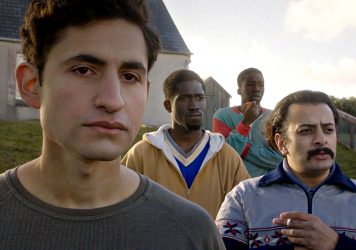A Syrian musician relocates to a remote Scottish island in Ben Sharrock’s comedy-tinged asylum seeker drama.
Cinema appears to have taken on a certain mantle when it comes to educating audiences about the dehumanising aspects that come from seeking asylum in a country that is not your own. A malevolent political wave, dead set on painting any/all incoming traffic as a blight on an already overburdened system, has managed to convince many that asylum seekers come to countries such as the UK on a carpet of rose petals and, upon arrival, are handed a wedge of banknotes to help them on their way. Ben Sharrock’s debut feature film Limbo makes the convincing case that this is simply not true.
And at the same time, the film takes place in a world that is a few increments displaced from gritty reality. Its story unfurls on a far-flung Scottish island where the local population is scarce and local amenities are virtually non-existent. It is, as the title suggests, a spartan landscape recontextualised as an outstretched, existential waiting room, with those who have been posted there forced to sit tight and wait for an indeterminate amount of time for their applications to be processed. Everything, including the whimsical locals, smacks of Father Ted’s own Craggy Island.
The central protagonist is Omar (Amir El-Masry), an up-and-coming Oud maestro (which is a little like a lute) who has fled from Syria in a different direction to his parents, who have ended up in Istanbul, and his brother, who has decided to stay home and fight for the cause. His communications with his parents, which allow him to wax nostalgic about happier times, take place in a decrepit phone box situated on the side of a dirt track in the middle of nowhere, and Sharrock has fun watching Omar’s displaced cohorts queue – they stand like statues as their disposable ponchos billow in the wind.
Sharrock sets out his absurd comic stall in the film’s opening scene in which a pair of grotesque social workers enact a short theatrical scene intended to demonstrate traditional British etiquette. Helga (Sidse Babett Knudsen) gyrates to some music while her accomplice Boris (Kenneth Collard) slithers around her in an inappropriate fashion. A sudden (and hilarious) reverse shot reveals a tightly packed room of male asylum seekers, and it channels the film’s central theme of an infantilising effect that comes naturally from a bureaucratic tier, and a polite but insidious fear of foreign cultures somehow sullying our own, far-from-passable social character.
Sharrock’s deadpan direction and his use of composition and lighting playfully filches from some of the greats such as Jacques Tati and, more recently, Aki Kaurismäki, but his shots are executed with a precision which suggests this is no mere homage. There is a lapse into sentimentality in its final stretch, where the perpetually adrift and confused Omar decides to get a grip on things, and the Oud, which he symbolically carries with him everywhere but refuses to play, eventually and predictably becomes a stand in for his conflicted feelings of national pride.
Published 26 Jul 2021
A festival circuit favourite and a bold new voice on the British cinema scene.
The first half is untouchable, though it loses its way a little on the home stretch.
Despite its use of humour, this is a hard-hitting film about being punished for desiring freedom.

A man fights to save his marriage in this heart-wrenching drama from writer/director Robert Machoian.

By Rory Doherty
The Scotland depicted in this incisive asylum drama is at odds with how the nation likes to see itself.